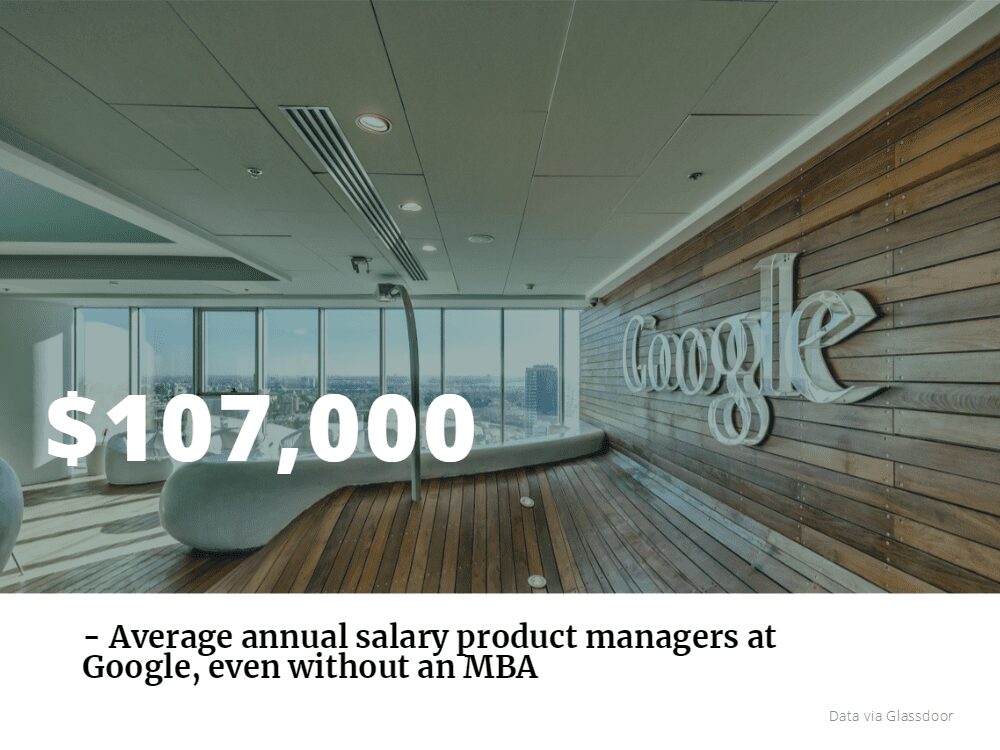The Top U.S. Entry Level Jobs and Internships of 2019

While work life balance, benefits, growth potential, and job security all factors to consider in your job search, the fact is that base compensation is more than likely the high priority. Getting an MBA is a sure way to increase earning potential, but where should you begin to look for the best internships and entry level jobs in such a vast and competitive playing field?
Glassdoor recently published its report on the highest paying internships and entry level jobs of 2019. We’ve broken down the report to help our readers discover just which of these positions and companies can offer them the best places to put their MBA talent to work.
Top 5 Entry Level Jobs for MBAs
One of the many pieces of good news from Glassdoor’s report is that as the number of tech jobs continue to increase, so does the need for business minded workers. This, along with the fact that finance and consulting positions follow right behind tech on the highest paid jobs list, should make b-school students optimistic for their prospects.
Product Manager
Product Management is a key role for any organization in the business of turning ideas into profit. According to blogger Dan Driscoll, who wrote a definitive article on the role, PMs are “closet-creative types with an ambitious acumen for business fundamentals and priorities, as well as masters of persuasion and consensus-building.”
Strong analytics skills along with a creative approach to problem solving are key for these positions. Engagement in design, development, support and marketing are all features of this role, which has a median base salary of $89,000 to start.

Major firms, such as Salesforce, are currently looking for top-tier product management candidates.
Investment Banking Analyst
Financial modeling, business valuation methods and strong presentation skills are just a few of the factors that comprise the Investment Banking Analyst role. The nuts and bolts of finance firms are the responsibility of the investment banking analyst, as they track live transactions along with M&A and private equity transactions.
At a starting median base salary of $85,000, this job is a great foundation on which to build a career.
Implementation Consultant
Implementation, according to coaching and recruiting site Firm Consulting, is one of the three main branches of consulting as a whole. Implementation teams take recommendations from Strategy and Operations consulting teams and turn them into realities. For instance, a company may be deciding to create a new division. Strategy and Operations consultants determine how best to profit from this, and implementation consultants make it happen.
ICs brand, execute and set up the division in this scenario, including relocation if necessary, along with on-boarding procedures. The starting base pay for ICs is $72,000.
Actuarial Analyst
Actuarial Analysts, who make a starting median salary of $66,250, are the workhorses of the insurance industry. Using statistical models, they analyze the probability and cost of various events (injury, accidents, and product failure, for example), and use this data to determine insurance policy pricing. Certification by either the Society of Actuaries (SOA) or the Casualty Actuarial Society (CAS) is required for these positions.
Actuaries must pass seven exams for the CAS and five in the SOA. This generally happens within a four-to-six year period, but students can begin the test while still enrolled in school. After passing the first and second exams, a student can start their first job. The ‘fellowship’ level of certification takes place over an additional two-to-four years.
According to the U.S. Bureau of Labor Statistics, the role of Actuarial Analyst has a 22 percent growth rate projected up to the year 2026.
Business Analyst
Business Analysts are key team players who make certain that companies’ current systems are as efficient as possible, and who develop strategic plans for growth. As agents of change, Business Analysts identify growth opportunities and reduce costs during these changes. Business Analysts work closely with IT departments to ensure that the best technologies are in place, and they also serve as a link between different departments of a company to ensure consistency.
Therefore, communication, diplomacy and a strong understanding of each business function are vital to success in this role. The four major components of development, modeling, process design (workflow creation), and systems analysis are the basic elements of the Business Analyst role.
To start, Business Analysts make a median salary of $63,000.
Top 5 Highest Paying Internships
Facebook leads the pack in paying its interns $8,000 per month, followed by: Amazon at $7,725; Salesforce at $7,667; Google, which pays $7,500, and Microsoft, offering interns $7,250 monthly.
Facebook tops Glassdoor’s 2019 ranking of the top-paying U.S. internships, with interns pulling in an estimated $8,000 per month
Each of these companies have highly competitive university recruitment programs. For details, see Facebook Careers, Student Programs at Amazon, Salesforce University Recruiting, Google Student Internships and Microsoft University Internships.
Those graduating now or in the near future from MBA programs have a solid advantage in today’s market; job growth is high in the U.S. and unemployment is low. While these high paying jobs and internships are clearly appealing for a reason, keep in mind that more intangible factors like company culture and proven trust in management are the things that will sustain you regardless of salary.
Top MBA Recruiters: Microsoft vs. Google

Microsoft and Google are two brands that are practically synonymous in tech. Google provides search and email services to billions, while Microsoft’s Office is a ubiquitous presence across college campuses and cubicles around the world.
Both companies have long been top destinations in tech but their reputation is rapidly growing within the business world as well. MBAs looking to enter tech may find their dream job at one of these companies.
Microsoft vs. Google: MBA Salaries
Both Microsoft and Google, unsurprisingly, compensate their employees handsomely. Given the numerous opportunities MBA graduates might have due to their past experience and interests, we will will examine only one position: Project Manager, a common entry-level position for many new MBAs.
According to Glassdoor, project managers at Microsoft earn an average annual salary of $96,520, which can rise sharply for MBAs. Average additional play, include cash bonuses, stock shares, and more, can increase the annual sum by a measure of $20,000.
At Google, project managers typically earn a bit more per year, with a current estimate around $107,000. With bonus and stock incentives, that can increase that figure by a measure of $40,000 or more per year.

Microsoft vs. Google: Company Culture
Google has one of the most infamous company cultures in the tech world. Aside from the well-known benefits of working at a Google campus, Google operates according to a philosophy; Ten things we know to be true. This document drives all of the work that the company does. It also influences who they choose to employ at their company.
In terms of office life, Google is extremely relaxed. Employees work hard, but they are given the space to do so in their own idiosyncratic ways. Employees are encouraged to be creative by working across departments to develop new products and come up with solutions.
In the past, Microsoft was a place known for its ruthless culture. Spearheaded by founder Bill Gates, Microsoft demanded a lot from its employees and cultivated a hostile workplace. Under the leadership of Satya Nadella, however, Microsoft encourages a growth mindset. This new attitude allows employees to learn from one another, as well as Microsoft customers.
Microsoft’s new approach to work has transformed the workplace as well. Rather than working employees like dogs, Microsoft now encourages its employees to maintain a work-life balance. In addition, the office has been opened, providing more spaces for collaboration and communication.

Microsoft has disconnected from its reputation as a rough employer, creating an inviting, fun culture of inclusivity and modernity / Photo via Scott Eklund/Red Box Pictures
Microsoft vs. Google: Employee Numbers
Operating at the forefront of innovation, Google and Microsoft are two of the largest employers in the technology sector. Google employs over 98,000 employees, while Microsoft has almost 135,000 employees.
Many of Google’s employees are centered at the Googleplex in Mountain View, California. The remainder are spread across more than 70 offices in 50 countries. Microsoft has 50,294 employees in its home region around the Puget Sound. The remaining employees are located in 646 office sites spread across 109 countries.
Microsoft vs. Google: Employee Satisfaction
Google and Microsoft offer generous benefits and make themselves accessible to address any employees concerns that may arise.
Both companies are ranked highly on lists of the best places to work. Google is eighth on Glassdoor’s “Best Places to Work” list for 2019, a list voted on by the employees at the companies themselves. Microsoft is ranked 34th on the Glassdoor list.
The business world has recognized the efforts of both companies to push innovation and creativity. Comparably.com surveyed employees and wrote a list of the companies with the brightest outlook—Google ranked 10th on this list and Microsoft ranked 12th.
School v. School: Michigan Ross v. Minnesota Carlson

Where should you go to school for your MBA? It’s a hard decision that has to factor in many different elements from location to reputation, alumni networks, ROI, and program options.
To help simplify the process for you, our School vs. School series takes a look at two similar top b-schools to compare and contrast their offerings. Today, we look at Michigan vs Minnesota to see which is best for you. Continue reading…
New MBA Jobs at Four Tech Companies Making Big Announcements

Some of the world’s largest tech companies made waves recently with exciting, and in some cases game-changing, announcements at and around the 2019 Game Developers Conference. These new ideas, products, and services were developed by teams comprised of developers, marketers, and MBAs brought on to bring innovation to the table. Continue reading…
Rutgers Students Spark Social Entrepreneurship, and More – New York News

Let’s explore some of the most interesting stories that have emerged from New York business schools this week, including Rutgers students jumping into social entrepreneurship.
Artificial Intelligence Gets Real – Stevens Institute of Technology School of Business Blog
Artificial Intelligence is now a $20 billion global industry and investment in AI is projected to triple in the next three years. AI is gradually reshaping many aspects of our daily lives right now. For instance, Apple’s Siri and Amazon’s Echo use AI-type processes, along with Google Maps and Translate. Notably, AI has become integrated into our transportation and medical systems, from self-driving buses, to diagnosing X-rays, AI has shown itself to be highly reliable for many processes.
Electrical and computer engineering professor K.P. “Suba” Subbalakshmi and founding director of SIAI (the Stevens Institute for Artificial Intelligence), asserts, “Simply put, our vision is to drive AI research and application that solves some of those tough ‘big’ problems that have so far resisted solving.”
AI will profoundly reshape society as we know it, but Subbalakshmi reassures the public,”It will permeate everything that we are doing, that’s a fact. But how it’s going to permeate sensibly and how that will affect our lives is in our hands, not the machines’.”
You can read more from the recent Stevens blog entry here.
Enactus Competition Sparks Student Interest in Social Entrepreneurship – Rutgers Business School News
Enactus is a group at Rutgers Business School that fosters social entrepreneurship as a way for students to empower their communities. Ben Foresti, a member of Enactus, worked with the chapter’s executive board to organize a social case competition that inspired a group of Rutgers students to create a unique high school-based incubator program to address food insecurity in New Brunswick.

“We thought a case competition would be a good way to introduce the wider public of Rutgers to social entrepreneurship,” Foresti says.
Foresti shares how he become involved in Enactus:
“While I was exploring clubs to join, I thought I wanted something that would give me good professional development and I was also looking to do something volunteer related. Enactus seemed like a good intersection of the two concepts. It offers professional development and there’s also the focus on improving your community in a sustainable way. It struck me as a perfect organization.”
Foresti reflects on his motivations for holding a social case competition. “We thought a case competition would be a good way to introduce the wider public of Rutgers to social entrepreneurship.”
You can find out more about the article here.
The Evolution of Wine Futures Pricing Research – Whitman School of Management News
Recently, professor Burak Kazaz of Syracuse University’s Martin J. Whitman School of Management delivered a talk late last year, offering faculty and Ph.D. students a closer look into his research on wine futures pricing. Kazaz’s research collected a range of data from New York to the Bordeaux region of France in order to to build a mathematical model that would predict wine futures prices.
During his talk, Kazaz provided an overview of the wine supply chain, which begins with the winemakers. He notes:
“It is important to note these wine markets do not sell only physical bottles of wine. They also sell wine futures. ‘En primeur,’ or wine futures, is a purchase method that allows distributors to purchase wine while it is still in the barrel before it is bottled.”
Kazaz’s predictive model has shown astonishing accuracy, with an average error rate of only 10 percent. Neil Taylor, vice president at Live-ex wrote to the team lauded Kazaz, “Your predictive model is certainly the most accurate I have seen of all of the work we have either done ourselves or participated with.”
Check out more from the recent article here.
Kellogg MBA Students Choose Best 2019 Super Bowl Ads

Aside from Tom Brady, Aaron Donald, and a shirtless Adam Levine, there’s no doubt that the Super Bowl commercials were the star of the night last Sunday.
The game, certainly, wasn’t the most thrilling. So the question is, what was the best ad of the 2019 Super Bowl? To get to the bottom of the question, a panel of Northwestern Kellogg MBA students got together to discuss each commercial. In the end, they looked for the ads that were the most and least effective at driving business and building their brands.
How Super Bowl Commercials Evaluation Works
First, before we dive into the best and worst ads, it’s important to know how the Kellogg MBAs made their evaluation. Working alongside two of the school’s most widely respected marketing professors—Time Calkins and Derek Rucker—the MBA panel applied the strategic ADPLAN framework.
A—Attention: Did the commercial engage the audience?
D—Distinction: Was the execution unique in delivery?
P—Positioning: Did the commercial represent the appropriate category and feature a strong benefit?
L—Linkage: Will the benefit and brand be remembered?
A—Amplification: Were viewers’ thoughts favorable?
N—Net Equity: Was the commercial consistent with the brand’s reputation and history?
From here, the MBA students came up with the final 2019 rankings.
Microsoft Super Bowl Commercial Wins
For the most effective ad, Microsoft took home the top prize. Their commercial spot was not only charming, but it stood out for its emotional tone and lack of clutter. The ad demonstrated Microsoft’s new adaptive controller and how it helps disabled kids play video games and form friendships. A clear benefit was apparent, showing how Microsoft technology makes the world a better place.
Amazon, Expensify, and Other Standouts
Other stand out advertisers for the Super Bowl included Amazon, Expensify, Washington Post, Pepsi, Bumble, and Google.
Bizarre Andy Warhol Burger King Commercial Flops
As for the least effective Super Bowl commercial, that honor went to Burger King. Their strange ad featured 1982 footage of Andy Warhol eating a Whopper, but it just came across as dull and uninteresting. Other advertising failures included the confusing Avocados From Mexico ad, Sprint’s flying horse disaster, the Turkish Airlines dark and scary spot, Mint Mobile’s unappealing chunky milk, and Simplesafe’s unbalanced ad. As for why each of these commercials failed, it always came back to a confusing message that didn’t deliver a clear benefit.
